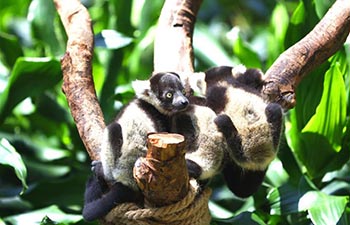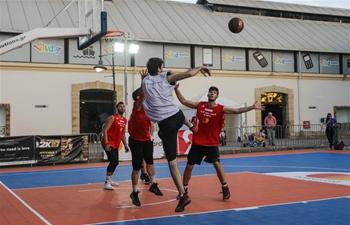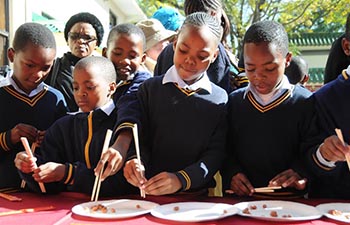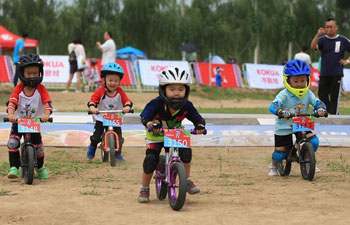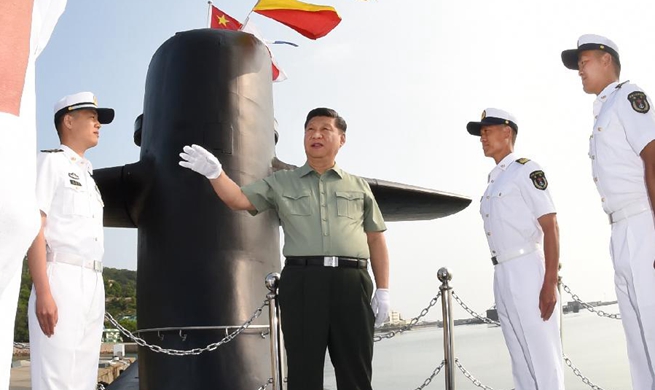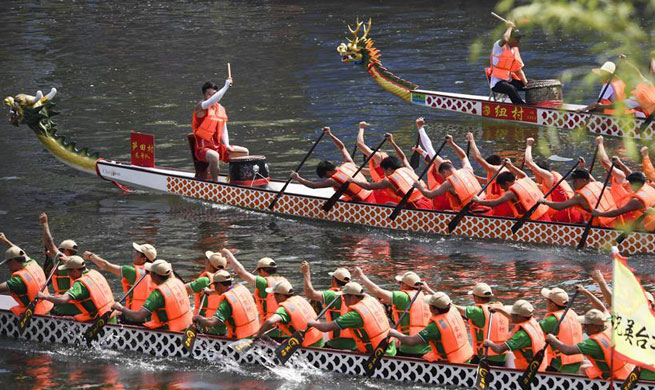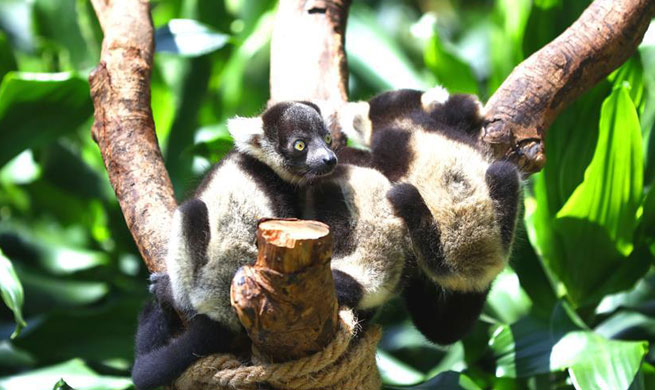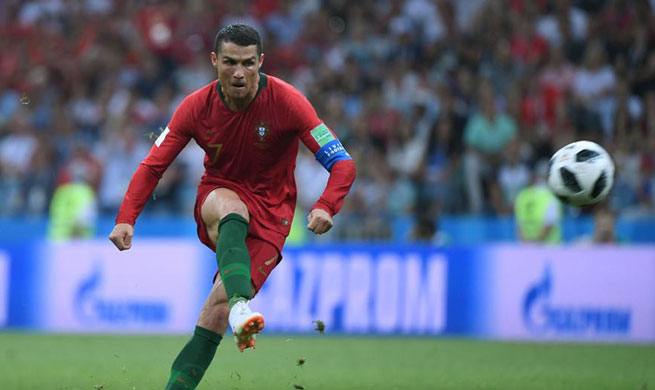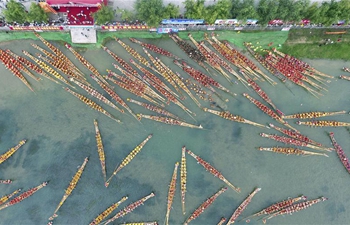URUMQI, June 16 (Xinhua) -- By day they work as a vegetable vendor in the bazaar, a herder on horseback, or even a dance director in a theater in the remote town of Tacheng. But every day when the clock strikes 8pm, this motley crew exchange their work clothes for their blue football outfits, and head to the pitch.
In the eyes of many people in this undeveloped border town in northwest China's Xinjiang Uyghur Autonomous Region, Tacheng United FC is as famous as Manchester United.
Despite their bellies, amateur skills, and the fact that they are going nowhere near the 2018 World Cup, the little team is dreaming big - of founding a football club as great as Manchester United.
SOWING THE SEEDS OF HOPE
Team captain Bao Yin, 37, works as a mail clerk in a local hospital. To him, football is more than a hobby. It saved him from the darkest time of his life.
Bao was orphaned in 1993 when his parents succumbed to disease, so the 12-year-old boy had to move out of town to live with his uncle in the countryside.
In his new home he was sad and weak, so his uncle suggested he start playing football. Once on the field, Bao made new friends and soon became happy again.
Next year was his first experience of watching a FIFA World Cup, and he looked on with awe and disappointment when Italian football star Roberto Baggio missed the decisive penalty in the final shoot-out against Brazil.
Sharing Bao's passion, around 50 keen footballers were drawn to form a team. While Tacheng United is yet to win any accolades in their five-year history, they are well-known in the town for their charity work. They play the beautiful game, but they also want to make their community beautiful.
They help create playing fields for local students and organize exhibition games for disabled children. Notably, in an exhibition game this month, some hearing-impaired children used sign language to cheer for them.
"Serving the community is always important to the team," Bao said.
Diao Jiankai, a teacher from a local special education school, was quick to praise the team's community outreach efforts. "On the field they are not as good as Manchester United, but off the field they have contributed to their neighborhood no less than the Red Devils. They have become the pride of the town."
But the team aims much higher than that. They want to develop this local amateur team into a professional football club so as to help promote the development of the sport in Xinjiang.
Football enjoys considerable popularity in Xinjiang. Local authorities estimate that about 100,000 youngsters in the region play football on a regular basis. Many of them are happy to play in the alleys or on the dusty ground with dustbins for goalposts, a similar scene to street football in Brazil.
However, development of the sport in the region is impeded by the underdeveloped local economy. Most top Chinese football clubs are based in the developed coastal provinces in east and south China. Many talented players in Xinjiang lack professional training and a platform to prove themselves.
Bao said that their planned football club will provide local young footballers with professional training facilities. "Local children have enough passion for the sport. All they need is some proper coaching."
To form a club, the team will select the best players. Some are said to be preparing for coaching and refereeing qualifications.
They are ambitious, but they must cope with many challenges. Deep-pocketed sponsors are in short supply in this underdeveloped town, and finding enough professional personnel to manage the different departments of the club is also proving difficult.
The local government has called for support for local teams in the fields of scheduling, administration and groundskeeping.
"If we don't try, we will never win," said Guo Jiehua, a founding member of the team.
Bao is keen to emphasize that some of today's illustrious names came from rather more humble beginnings.
"140 years ago, a group of British railway workers founded a team called Newton Heath LYR Football Club. At that time, who would have thought that it would become the famous Manchester United? We sow the seeds of hope here. Maybe the next Chinese football star will come from Tacheng United."
"FOOTBALL IS OUR COMMON LANGUAGE"
The team is the epitome of the town, according to Bao. With a population of 170,000, Tacheng is a melting pot of 25 ethnic groups.
"The starting 11 are from six ethnic groups -- Han, Uyghur, Kazakh, Daur, Mongolian and Hui," said Bao, who is a Daur, "This is true Tacheng style."
On the field, players may shout tactics in Kazakh, while off the field they usually speak Chinese.
"Football is our common language," said Bao.
Before forming this team, Bao loved playing matches with local amateur teams at weekends. But he was quite concerned by the fact that every team was comprised of players almost from the same ethnic group.
What bothered Bao most was that sometimes a victory would be regarded as proof of one ethnic group being superior to another. "A game is a game, it has nothing to do with ethnicity."
"This is not Tacheng style," Bao said, "I grew up playing football with kids from different ethnic groups. I think Tacheng should have a football team like that."
So it was that he founded a new team along with 16 football fans in 2013. They called it "Tacheng Multi-ethnic Youth United", or "Tacheng United".
With an average age of 30, the players come from all walks of life, with the team containing doctors, police officers, porters, civil servants, herders, teachers, and market vendors.
Bringing all these people together is never easy. Different educational backgrounds, work experiences and folk customs have always given rise to misunderstandings or even conflicts. Unlike professional players who usually settle their disputes in the locker room, Tacheng's differences usually spill over onto the pitch.
Impetuous Mongolian striker Bayan Dagla used to argue with other players so much that Bao had thought about dismissing him.
"I used to be a professional player so I know better how to play. So I was too impatient with others," Bayan admitted.
In the end, it was the recipient of Bayan's ire who convinced Bao to let the Mongolian stay. Bayan also learned to moderate his temper.
In the process of learning to get along with each other they have created chemistry out of conflicts. "Some players have improved a lot. Now we have a more stable squad," said Bao.
Off the field, the diversified team is like a family. It has become a tradition to go to teammates' homes to enjoy various ethnic specialties after playing a game. They hold parties to celebrate the Spring Festival, Obo Festival, Corban Festival and other important ethnic festivals and holidays.
"Establishing the team is like a dream come true for me," said Bao, "We have devoted all we had gained from the sport to our team -- love, teamwork, endeavor, tolerance and sharing."




